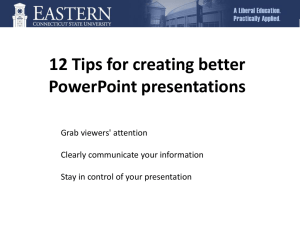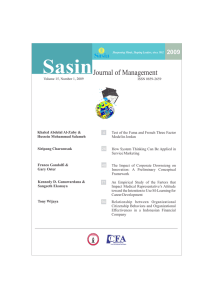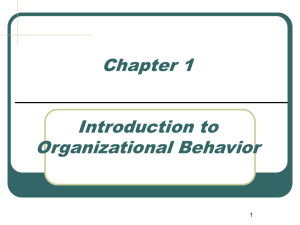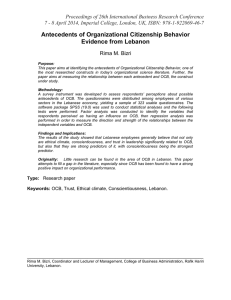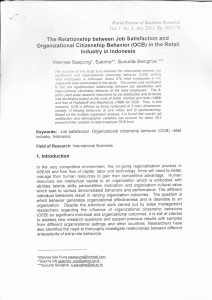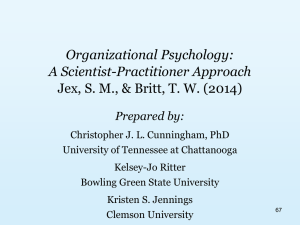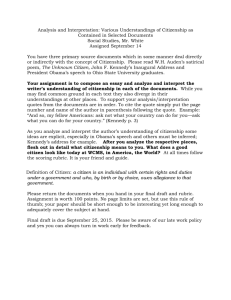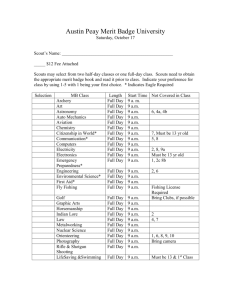OCB -BAT 2072
advertisement
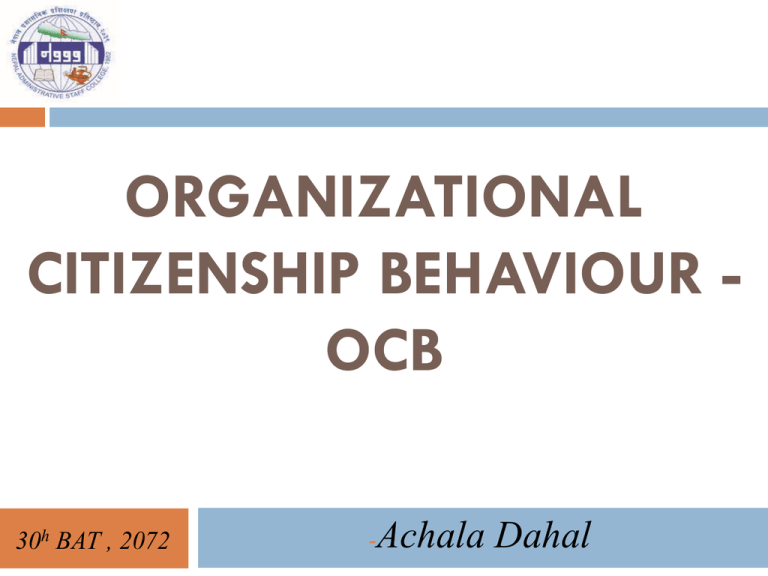
ORGANIZATIONAL CITIZENSHIP BEHAVIOUR OCB 30h BAT , 2072 - Achala Dahal Session outline OCB Concepts Working with checklists Measures of OCB Dimensions of OCB Factors that promote OCB Potential pitfall Findings Conclusion Definition Organizational Citizenship Behaviors are a special type of work behavior that are defined as individual behaviors that are beneficial to the organization and are discretionary(optional), not directly or explicitly recognized by the formal reward system (Organ). An organization's ability to elicit employee behavior that goes above and beyond the call of duty are intended to benefit the organization and/or its members can be a key assets and one that is difficult for competitors to imitate. OCB thus, can be defined as the superior efforts that employees make on behalf of their organization. These behaviors are primarily matter of personnel choice as omission is not considered as punishable in the organizations. These are extra role employees show beyond their regular job description and organization rules and regulation. 6 OCB.mp4 30th BAT Why it is name OCB?? The whole organization is viewed as a little city and employees as a citizen. As every citizens want their city to be clean, followed by rules and regulation to build it as a role model. Likely employees show behavior as a citizen of an organization to take the organization to extra miles. Notion of Good Citizen Employee who religiously obeys all rules and regulations, even when no one is watching, is regarded as a “Good Citizen.” S/he help coworkers; protect the organization’s interests; make constructive suggestions; develop oneself as an asset to the organization and spread goodwill and boost morale Three types of Employees Three types of Employees Individual Exercise Working with individual understanding and OCB Checklists Measures of OCB Helps other employees with their work when they have been absent. Exhibits punctuality in arriving at work on time in the morning and after lunch and other breaks. Volunteers to do things not formally required by the job. Takes the initiatives to orient new employees to the department even though it is not part of their job description. Exhibits attendance at work beyond the norm. Helps others when their work load increases. Coasts towards the end of the day. Gives advance notice if unable to come to work. Makes innovative suggestions to improve the overall quality of the department. Does not take extra breaks. Willingly attends functions not required by the organisation but that helps its overall image. Does not spend a great deal of time in idle conversation. Five dimension of OCB Altruism (निस्वार्थ) It is the discretionary behaviors that have the effect of helping a specific work colleague with an organizationally relevant task or problem. Behavior that is directly and intentionally aimed at helping a specific person in face-to-face situations (e.g. orienting new people, assisting someone with heavy workload) Conscientiousness (स्वबििेक) It consists of behaviors where employees accept and adhere to the rules, regulations, and procedures of the organization. Does not take extra breaks. Obey company rules and regulations even when no one is watching. Civic virtue It is characterized by behaviors that indicate the employee’s deep concerns and active interest in the life of the organization. Interest in or commitment to the organization as a whole. Shown by a willingness to participate actively in its governance (e.g., attend meetings, engage in policy debates, express one’s opinion about what strategy the organization ought to follow). Courtesy It has been defined as discretionary behaviors that aim at preventing work-related conflicts with others. Take steps to try to prevent problems with other workers. Does not abuse the rights of others. Sportsmanship It has been defined as a willingness on the part of the employee that signifies the employee’s tolerance of less-than-ideal organizational circumstances without complaining and blowing problems out of proportion. Factors that promote employee citizenship 1. 2. Job satisfaction: Happy workers are good organizational citizens. Interesting work and job involvement: when employees are given interesting work assignments and jobs in which they can really immerse themselves, they are more likely to go beyond the call of duty. Satisfaction leads engagement 3. Organizational support: Employees who feels that their organizations really care about them are more likely to support the organization with higher level of citizenship. 4. Trust, organizational justice, and psychological contract fulfillment: citizenship is likely to occur when employers are trustworthy, fair and live up to the commitments they have made to their employees. Team Work Matters 5. Transformational and supportive leadership: Employees are willing to go the extra mile when they work for inspirational and supportive managers. 6. Employee characteristics: Employees who are conscientious, optimistic, extroverted, empathetic, and team-oriented may be more willing to engage in certain types of citizenship behavior. OCB: Potential Pitfalls Discrimination: - Gendered expectations – research has shown that men are rewarded for OCB more than women Organizational Justice: - If some supervisors reward OCB more than others, perceived unfairness may increase among certain clusters of employees. Habituation: - If OCB is rewarded regularly, you may find that OCB levels will rise across the organization over time. citizenship pressure- may impact negatively on employee stress levels. Findings and research One Plank at a Time: Building the Bridge from OCBs to Performance (2011) • Topic: Job Performance, Citizenship Behavior Publication: Journal of Applied Psychology Article: A Moderated Mediation Model of the Relationship Between Organizational Citizenship Behaviors and Job Performance • OCB – TEAM MEMBER EXCHANGEPERFORMANCE Organizational Citizenship Behavior in Public and Private sector and Its Impact on Job Satisfaction: “A Comparative Study in Indian Perspective” Is it Fair to Include “Citizenship” in Performance Appraisal ? • Topic: Citizenship Behavior, Performance Appraisal Publication: Journal of Business and Psychology (DEC 2009) Article: Organizational citizenship behavior in performance evaluations: Distributive justice or injustice Help the Organization and…Help Yourself!!! • Topic: Citizenship Behavior, Interviewing, Selection Publication: Journal of Applied Psychology Article: Effects of organizational citizenship behaviors on selection decisions in employment interviews. (March 2011) Organizational Citizenship: more than a matter of “scratching backs • Topic: Citizenship Behavior, Fairness Publication: Journal of Applied Psychology Article: Paying you back or paying me forward: Understanding rewarded and unrewarded organizational citizenship behavior Conclusion OCBs are relevant in virtually any job, regardless of the particular nature of its tasks as they promote effectiveness of work units and organizations become even more vital during organizational crises, when beneficial suggestions, deep employee involvement, and a positive “public face” are critical. It’s time for Feedback Achala Dahal Nepal Administrative Staff College Jawalakhel, Lalitpur Email: achala.dahal@nasc.org.np
